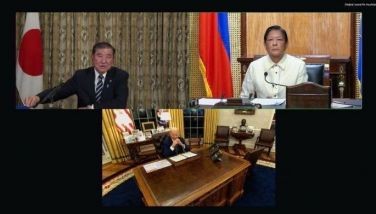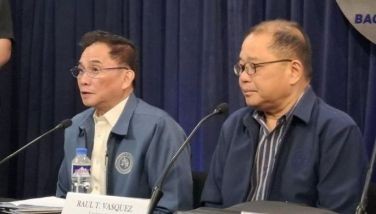Back to FATF blacklist for RP?
MANILA, Philippines – The government fears that the Philippines could be returned to the blacklist of the Financial Action Task Force on Anti-Money Laundering (FATF) after the Supreme Court ruled that the Anti-Money Laundering Council (AMLC) could not look into a bank account without notice to the owner.
The World Bank and the Asia Pacific Group on Money Laundering (APG) are scheduled to conduct a joint evaluation of the Philippines in October.
In a 38-page motion for reconsideration, the Office of the Solicitor General has asked the Supreme Court (SC) to set aside its decision, which effectively prevented the AMLC from examining bank accounts ex parte.
Solicitor General Agnes Devanadera said bank inquiries conducted by the AMLC are “like a search warrant,” which must be issued without notice.
“It is undeniably issued ex parte precisely because notice and hearing prior to issuance would frustrate its objective,” she said.
Devanadera said notice and hearing would give the account holder the opportunity to conceal money, leaving authorities with “an empty bag” by the time the search is conducted.
“While any further inquiry may allow government to obtain the desired information, the forfeiture or recovery of the proceeds becomes illusory,” she said.
Devanadera said a bank inquiry is an “asset discovery tool” and also an “asset recovery tool” since the law requires that recovery of proceeds of crimes must be made immediately.
The Anti Money Laundering Act had to be amended to satisfy the FATF requirements, she added.
Devanadera said even if the country does not immediately end up in the list of Non-Cooperative Countries and Territories (NCCT), countries could apply appropriate counter-measures against transactions originating in the Philippines or involving Filipino citizens and entities.
“Counter measures may include limitations on migration,” she said.
Before the AMLA was amended, the US Financial Crimes Enforcement Network singled out the Philippines and related transactions for scrutiny, causing problems in correspondent banking, trade and commerce, Devanadera said.
Officials fear that the SC decision could land the Philippines back in the NCCT list, which had been empty since the blacklisted countries complied with anti-money laundering standards.
Hopping back into the NCCT list would make the Philippines the first and only country to be removed and reinstated for insufficient application of FATF recommendations, the officials added.
The APG and the FATF conduct periodic reviews that examine compliance with international anti-money laundering standards.
The fall-out would also include possible suspension of the country’s standing in international financial intelligence groups such as the Egmont Group, which facilitates exchange of critical financial data between jurisdictions.
- Latest
- Trending
































